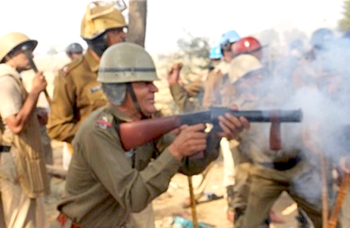 Chandigarh, Nov 19: Over 200 people were injured in a clash after the Haryana Police launched a major but futile offensive on Tuesday to arrest controversial self-styled godman Rampal in his sprawling ashram in Barwala village.
Chandigarh, Nov 19: Over 200 people were injured in a clash after the Haryana Police launched a major but futile offensive on Tuesday to arrest controversial self-styled godman Rampal in his sprawling ashram in Barwala village.
The area turned into a battle zone. The police operation was met with huge resistance from Rampal’s “private army of armed commandos” who fired gunshots from inside and hurled petrol and acid bombs injuring 105 cops, including a station house officer (SHO) who was injured in the neck.
Hours after the operation, the sect spokesperson said the police action had killed four women devotees. Their bodies were on the sect premises.
The hunt for the “godman” turned the area into a warzone, but Rampal’s arrest remained unsuccessful forcing the police to put off the operation.
Soon after the operation began, the sect disclosed that Rampal was not on the 12-acre premises, but in hospital undergoing treatment. Haryana Director-General of Police S N Vashist said: “Rampal is 100 per cent inside the ashram. The operation will now only end with the arrest of Rampal.”
Mediapersons were targeted by the police in the melee. Over a dozen journalists were beaten by the police who broke their cameras, chased them with lathis and pushed them from the scene of action. The police said at least 85 sect followers were injured in the action. Dozens of ambulances kept ferrying the injured to hospitals.
The police used brute force against the agitators. Women were dragged by cops and bundled into buses.
The police resorted to tear gas shells and cane-charge to disburse the women and children who lined up outside the sect to prevent Rampal’s arrest.
Bullet shots, acid pouches and petrol bombs were thrown at the police from inside the high walls of the ashram. Later, the police stormed the ashram . The police had to retreat as they entered the inner zone of the ashram as the area had an LPG dump . Rampal’s supporters burnt an excavator that was brought to dismantle the walls.
Vashist said they received a call from inside the sect on Tuesday morning from a follower who said that many inside the premises were being forced to stay inside and defend a possible police action.
He said babies were being used as shield. Guns, pistols and rifles were used to attack the police. Retired army and policemen owing allegiance to the sect had trained youths inside for a counter-offensive.
The Bharatiya Janata Party government is now under severe criticism for letting the situation escalate. The High Court has set Friday as the deadline to arrest Rampal who is to be produced in a case of contempt of court.





Comments
Add new comment